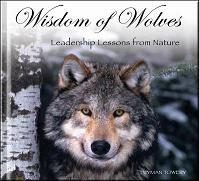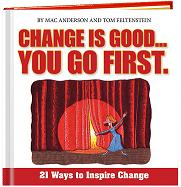 The following is from Wisdom of Wolves: Leadership Lessons from Nature by Twyman Towery
The following is from Wisdom of Wolves: Leadership Lessons from Nature by Twyman Towery
When a wise human being dies, whether it be Aristotle, Confucius, Helen Keller, Winston Churchill or the local barber who dispenses sage advice, society suffers. It is not different in the society of wolves. The death of an adult wolf can seriously jeopardize the entire pack, knowledge of safe den sites in which to raise pups, game trails favored by quarry, or reliable watering holes may disappear with the loss of an elder wolf. The elimination of a key wolf means the sacrifice of years of experience, knowledge and leadership ability.
Likewise, without proper preparation, the loss of a key executive can severely damage a company. A parent’s death often either pulls the remaining members of the family closer together or begins a process of bickering and disintegration. Fortunately, the wolf pack elders constantly teach and mentor the younger wolves, giving them opportunities to fail, learn and grow into positions of leadership.
The entire pack hunts, plays and helps raise its pups together. All of these activities serve to reinforce the pack’s social order and traditions. Younger wolves respect the unique gifts the elders possess, which is illustrated by the deference they show them. Therefore, the death of a single wise wolf, while damaging, is not usually fatal to the pack, for the younger wolves have been prepared well.
Nature’s law of survival of the fittest continues to operate in the world of the wolf. Just as the weakest caribou are taken by the wolves, the weakest wolves also disappear. Human hunters often don’t seem to understand this basic law, for they are intent on killing the biggest and strongest animals so they can mount the showiest, most impressive trophies.
It is natural survival in reverse. While limits are set on the number of wild animals we can kill, there are no limits or restrictions on taking the best of the breed. I don’t ever remember hearing a hunter (myself included) say, “OK, let’s go out and shoot the weak and the ill so the breed will be improved rather than minimized.” And yet, this is exactly what wolves do when they hunt.
Could it be that to become more rational human beings, we need to learn from the so-called “primitive” behavior of the wolf? How strange.
One very successful company I have worked with has a large banner hung over the entrance way that boldly proclaims, “Reward failure.” This may seem strange at first, but when you understand the logic behind it, the simple wisdom is apparent. If no one fails, then no one is trying anything new, innovative or different. This happens because people are afraid they will be punished if their efforts are not successful, so they play it safe and do things the way they have always done them. Meanwhile, the competition eats their lunch.
Encouraging risk taking may mean the death of one idea that didn’t work, but the attitude and determination to improve will insure the long-term survival of the organization.
If you’d like more lessons on leadership, purchase “Wisdom of Wolves: Leadership Lessons from Nature” at the Inspired Faith Gift Store from Beliefnet.
Reprinted by permission of Simple Truths (c) 2011. In order to protect the rights of the copyright holder, no portion of this publication may be reproduced without prior written consent. All rights reserved.

